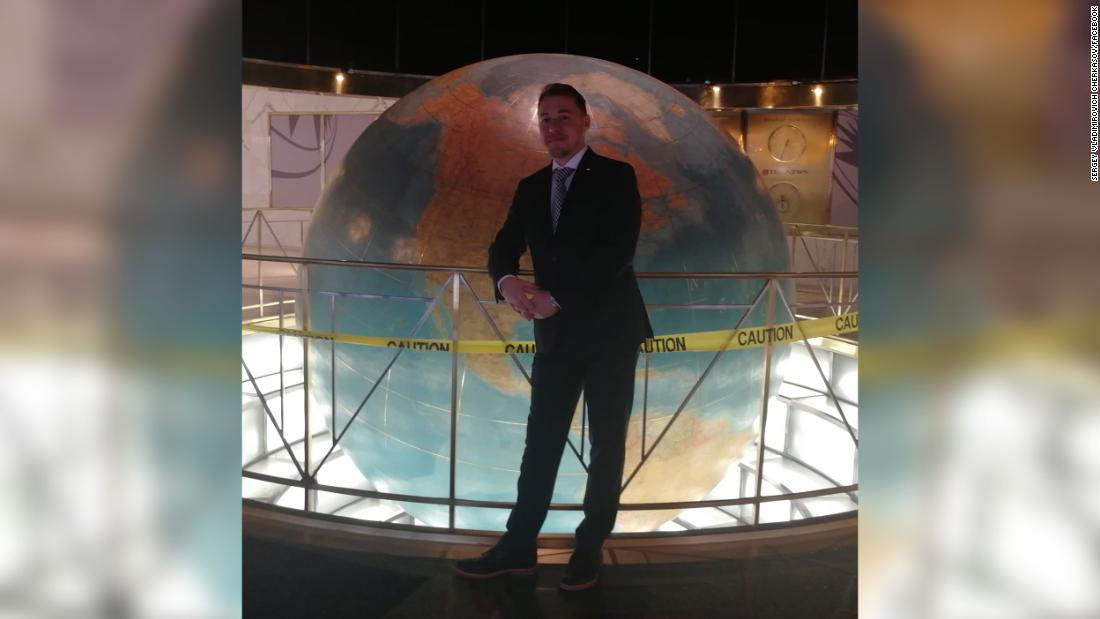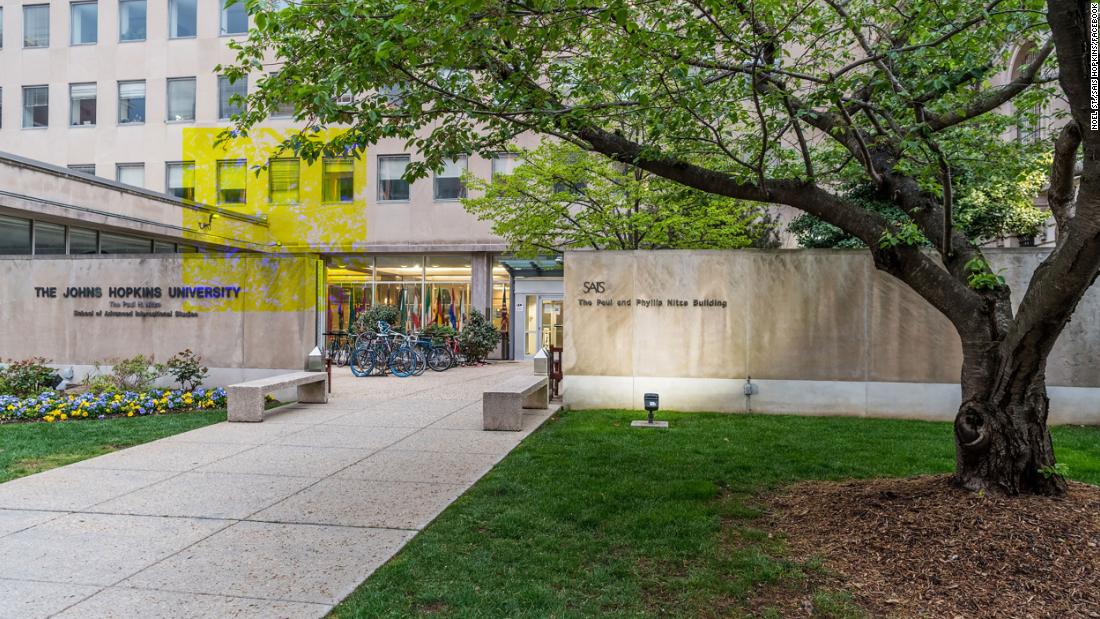
Gregarious, smart, and often seen toting a helmet for his beloved motorcycle, “Muller” was known, and even liked, by his fellow students and the faculty at SAIS. But his muddled accent caught the ear of a few classmates. On one occasion, a fellow student asked him outright: Are you Russian?
The spy brushed off the question. He was from Brazil, he said in what turned out to be part of the elaborate cover identity he spent years building.
“Looking back, it was a red flag,” the former classmate told CNN, speaking on the condition of anonymity. “I remember thinking at the time it didn’t really make sense.”

“Muller” graduated from SAIS in 2020. Last week, a Dutch intelligence agency publicly identified him as Sergey Vladimirovich Cherkasov, a Russian military intelligence officer who in April traveled to the Netherlands to start an internship at the International Criminal Court (ICC). From there, he would have had a perch to spy on war crimes investigations into Russian military actions in Ukraine and elsewhere, sources say.
Dutch officials stopped him at the border and sent him back to Brazil, where he had been living under the forged identity of a Brazilian man whose parents are deceased, according to Brazilian police.
It was not immediately clear when the US became aware of Cherkasov’s true identity. The FBI has an active investigation open, according to one source familiar with the intelligence. US and Dutch intelligence agencies shared information about Cherkasov some time ago, according to a separate US official, though it’s not clear when that occurred. Yet another US official wouldn’t address how the Russian intelligence connection came to light, adding that the FBI worked closely with the Dutch authorities on tracking his activities.
The revelation of Cherkasov’s true identity has roiled faculty at SAIS. But to former intelligence officials, Cherkasov fits a well-known pattern: Russia, among other foreign powers, seeks to place young intelligence operatives in American academic institutions to help build their deep cover identities.
Often, the mission of so-called “illegals” — a spy operating under an identity not linked to the Russian government in any way — is to do little more than simply establish legitimacy as a student, said John McLaughlin, a former deputy director of the CIA who now teaches at SAIS.
“It’s not unusual,” McLaughlin said. “My sense is that passing through SAIS was a kind of laundering experience for him. These Russian illegals tend to go through a long process of credentialing themselves in order to establish credibility as who they claim to be.”
SAIS declined to comment when reached by CNN on Friday. But in an email to faculty and students obtained by CNN, SAIS dean Jim Steinberg confirmed that Cherkasov graduated in 2020.
“We are continuing to monitor developments, but we have no further information to share at this time,” Steinberg wrote.
Cherkasov did not respond to a phone call or text message seeking comment on Friday.
‘Teacher’s favorite’
Cherkasov appears to have carried out that mission quite successfully. One of Cherkasov’s professors — who taught a class on genocide — wrote his reference letter for the internship at The Hague.
In another SAIS class, “he was the teacher’s favorite,” said another classmate, who like other former classmates spoke to CNN on the condition of anonymity out of fear of retaliation from the Russian security services. “He was a very nice guy, very open-minded, very active in class.”
“This guy I would have never suspected [of being a spy],” the former classmate told CNN.
A third former classmate of Cherkasov, a US military officer, struck up a conversation one day with Muller about their shared love of motor bikes. Eventually he got the impression that he and Muller might go for a ride together, the military officer told CNN.
But then, he asked Muller if he spoke Russian, since it sounded like he might based on his accent.
Muller denied being able to speak Russian and became withdrawn, the military officer said. The motor bike ride never happened.
Multiple former intelligence officials told CNN it would not be unusual for US counterintelligence officials to allow a Russian “illegal” to continue his studies in order to watch him and try to learn who his contacts are, whether he is operating in a larger network inside the United States, and how he is building his cover. It’s possible the US tipped off the Dutch intelligence service, these people said.
The Office of the Director of National Intelligence declined to comment on the case.
But another former counterintelligence officer noted that US intelligence services sometimes aren’t aware of student spies until they become more actively engaged in carrying out espionage — and only then, do they trace their histories back to SAIS or other academic institutions in the United States with a foreign policy bent.
‘Insider threat’
Why the Kremlin would want to plant a spy in the International Criminal Court is clear, former intelligence officials say: It would offer Russia a crucial window into the investigation into alleged Russian war crimes — in Georgia in 2008 and in Ukraine in 2022.
“For those reasons, covert access to International Criminal Court information would be highly valuable to the Russian intelligence services,” Dutch intelligence said in its statement.
Effectively planting a spy is increasingly difficult for intelligence services across the globe, thanks to ubiquitous surveillance technology and the degree to which most people live their entire lives online in 2022. An online profile that only popped up a few years ago, or a profile that suddenly goes inactive, can be a tip-off for counterintelligence officers trying to spot spies.
The problem is equally difficult for American spies operating abroad under “nonofficial cover,” a so-called NOC.
“Any sort of durable long-term illegal is not a dying breed but far more difficult to do now than it once was,” said one former US counterintelligence official. “And that’s true for everybody.”
The US arrested and deported 10 Russian operatives as part of a spy swap with Moscow in 2010, one of whom had graduated from Harvard’s John F. Kennedy School of Government 10 years before and had been living in Cambridge with his wife and two children. Harvard subsequently stripped Andrey Bezrukov — who went by the name Donald Heathfield — of his degree. His wife, Elena Vavilova, graduated from McGill University and was deported as part of the same swap.
Cherkasov had similarly sought to quietly build an alternate identity over the course of years. The Dutch intelligence agency published a crude “legend” that it says was probably written by Cherkasov in mid-2010, laying out his false history as a Brazilian man born in Rio de Janeiro in 1989. He details this fake family history through multiple generations, offering a myriad of small personal idiosyncrasies: a hatred for fish, a beloved aunt, a crush on a geography teacher.
In 2014, Cherkasov began attending college at Trinity College Dublin, studying political science and graduating in 2018. The same year, he traveled to the United States to obtain his master’s degree at SAIS.
Unanswered questions
Throughout his time as a student, Muller maintained an active digital life. In 2017, he started a blog on geopolitics, according to the open-source intelligence company Bellingcat. He maintained a Facebook and a Twitter account, full of friends from both schools and, in September 2018, published a YouTube video introducing his new motorcycle. In the video, a man whom Bellingcat identifies as Cherkasov can be heard chuckling and greeting at a trolley of tourists riding near the Potomac River.
Although it’s not clear how far back Russian intelligence plotted to place Cherkasov at The Hague — some former intelligence officials said it might have been opportunistic rather than a long-running plan — Cherkasov did take classes that made sense for a student interested in The Hague as a career path, including a class on genocide.
A policy memo that Cherkasov wrote for one of his SAIS classes exhibits the sober and anecdote-rich analysis one might expect from a student of international affairs. The memo, obtained by CNN, advocates potential US responses at the United Nations to help stop a genocide. It’s the sort of US policy discussion that has in recent months applied to trying to curtail Russian violence in Ukraine.
And according to multiple people familiar with him while at SAIS, Cherkasov was a good student — smart, engaged and talkative in class.
One class that Muller either enrolled in or audited was on strategic diplomacy, popular with US military and intelligence professionals, and taught by Steinberg, a former deputy secretary of State in the Obama administration and current dean of SAIS, according to one of the former SAIS students.
SAIS faculty and students have been left stunned by the revelation that the Brazilian student with the funny accent was, in fact, a Russian spy. SAIS faculty who spoke to CNN on the condition of anonymity say that the school’s communication to them has been bare bones, little more than an acknowledgment of the public reporting.
“It’s off-putting,” said the former SAIS student who pressed Cherkasov on his accent. “For me, it raises a lot of questions about how he was admitted to SAIS, how he was able to travel.”





